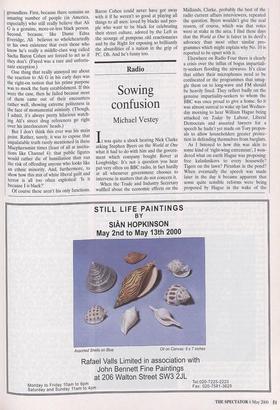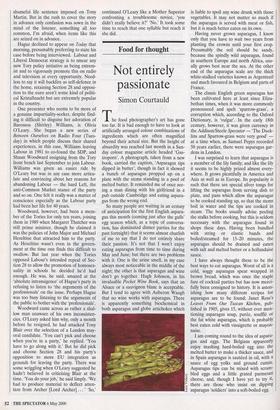Radio
Sowing confusion
Michael Vestey
It was quite a shock hearing Nick Clarke asking Stephen Byers on the World at One what it had to do with him and the govern- ment which company bought Rover at Longbridge. It's not a question you hear put very often on BBC radio, in fact hardly at all whenever government chooses to intervene in matters that do not concern it.
When the Trade and Industry Secretary waffled about the economic effects on the Midlands, Clarke, probably the best of the radio current affairs interviewers, repeated the question. Byers wouldn't give the real reason, of course, which was that votes were at stake in the area. I find these days that the World at One is fairer in its devil's advocacy than most other similar pro- grammes which might explain why No. 10 is reported to be upset with it.
Elsewhere on Radio Four there is clearly a crisis over the influx of bogus impartiali- ty-seekers flooding the airwaves. It's clear that either their microphones need to be confiscated or the programmes that smug gle them on to long-wave and FM should be heavily fined. They reflect badly on the genuine impartiality-seekers to whom the BBC was once proud to give a home. So it was almost surreal to wake up last Wednes- day morning to hear William Hague being attacked on Today by Labour, Liberal Democrats and assorted lawyers for a speech he hadn't yet made on Tory propos- als to allow householders greater protec- tion in defending themselves from burglars.
As I listened to how this was akin to some kind of `right-wing extremism', I won- dered what on earth Hague was proposing: free kalashnikovs to every housewife? Tigers on the lawn? Piranhas in the pond? When eventually the speech was made later in the day it became apparent that some quite sensible reforms were being proposed by Hague in the wake of the shameful life sentence imposed on Tony Martin. But in the rush to cover the story in advance only confusion was sown in the mind of the listener, something all too common, I'm afraid, when items like this are seized on in advance.
Hague declined to appear on Today that morning, presumably preferring to state his case before being interviewed. Labour and Liberal Democrat strategy is to smear any new Tory policy initiative as being extrem- ist and to vigorously promote this on radio and television at every opportunity. Need- less to say it will backfire as self-defence in the home, retaining Section 28 and opposi- tion to the euro aren't some kind of politi- cal Kristallnacht but are extremely popular in the country.
One presenter who seems to be more of a genuine impartiality-seeker, despite find- ing it difficult to disguise her adoration of Baroness (Shirley) Williams, is Olivia O'Leary. She began a new series of Between Ourselves on Radio Four (Tues- day) in which people discuss their shared experiences, in this case, Williams leaving Labour in 1981 to co-found the SDP, and Shaun Woodward resigning from the Tory front bench last September to join Labour. Williams was given an easier ride by O'Leary but was in any case more articu- late and convincing about her reasons for abandoning Labour — the hard Left, the anti-Common Market stance of the party and so on. One felt it really was a matter of conscience especially as the Labour party had been her life for 40 years.
Woodward, however, had been a mem- ber of the Tories for only ten years, joining them in 1989 when Margaret Thatcher was still prime minister, though he claimed it was the policies of John Major and Michael Heseltine that attracted him to the party. As Heseltine wasn't even in the govern- ment at the time one finds this difficult to swallow. But last year when the Tories opposed Labour's intended repeal of Sec- tion 28 to allow the promotion of homosex- uality in schools he decided he'd had enough. He was, he said, amazed at the `absolute intransigence' of Hague's party in refusing to listen to 'the arguments of the professionals' on the issue. Perhaps Hague was too busy listening to the arguments of the public to bother with the 'professionals'.
Woodward came across as rather a shal- low man unaware of his own inconsisten- cies. O'Leary asked him why, only a month before he resigned, he had attacked Tony Blair over the selection of a London may- oral candidate. 'You can't pick and choose when you're in a party,' he replied. 'You have to go along with it.' But he did pick and choose Section 28 and his party's opposition to more EU integration as grounds for leaving the party. There was some wriggling when O'Leary suggested he hadn't believed in criticising Blair at the time. 'You do your job,' he said limply. 'We had to produce material to deflect atten- tion from Archer [Lord Archer] ... "So,' continued O'Leary like a Mother Superior confronting a troublesome novice, 'you didn't really believe it?' No.' It took some time to reach that one syllable but reach it she did.



































































 Previous page
Previous page